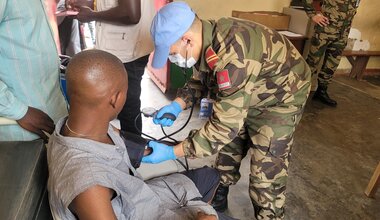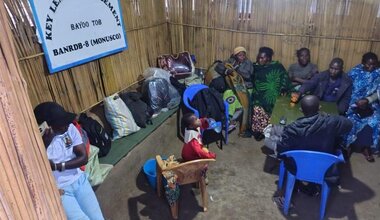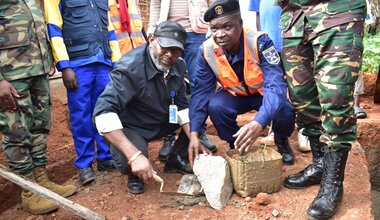We can be proud of our UN Volunteers serving in peacekeeping in DRC
On 29 May, we celebrate International Peacekeeping Day and the contributions of UN Volunteers to advance peace in the world. For this occasion, DRC in Focus met, Kevin Gilroy, Chief of Peace and Development Division, UNV, on the eve of his departure from UNV in May of 2014. After many years spent with the UNV Programme at headquarters and in the field, he shares with us his experience and thoughts especially given his key in building the 22-year long partnership between UNV and UN Peacekeeping Operations (DFS/DPKO,)and insight about the critical role UN Volunteers play in in peacekeeping!
UNV in DRC - How did you join the UNV programme ?
Kevin Gilroy - I joined the UNV programme in 1985 as a UN Volunteer. At this time I was serving as UNV Programme Officer at UNDP Office in Sri Lanka. We had 30 UN Volunteers on average. My job was to help them and I really enjoyed doing that. Then the war broke out in 1987 and the situation got very bad. For the last two years of my assignment, after all the UN Volunteers were evacuated, I became really involved helping UNDP in security and crisis management. It was a great experience and also my first exposure to hard core violence and war. By the end of 1989 after 4-years of my UNV assignment, I joined UNV headquarter in January 1990.
Was it your first volunteer experience?
Actually no! Just before joining UNV, I worked as a Peace Corps Volunteer in a very rural area in Liberia for two years. While I was there, I met 3 UN Volunteers. I was fascinated by the fact you could volunteer for the UN as I loved my volunteer assignment with Peace Corps and the opportunity to meet and work with people from different backgrounds and nationalities appealed greatly to me. Then I applied and this is how I became a UN Volunteer in Sri Lanka.
The partnership between UNV and the Department of Peace Keeping Operations (DPKO) dates back to the UN mission in Cambodia, where you were the UNV Programme Manager. Could you tell us something about it and how it has evolved?
Before the 1990’s, the UNV programme was mainly involved in long-term development, with our volunteers serving two-year contractual family assignments and longer. The year 1990 was critical for the UN and the UNV programme: the Berlin Wall had fallen down, the world had changed, and post-Cold War peace agreements spawned, but so did many new civil wars. As a result, peacekeeping and humanitarian work grew dramatically. For the first time, the UNV programme was asked to set up an emergency humanitarian response team for the post-war in Irak. That was 1991, and I was sent down there to set up an office and recruit short-term volunteers – which was a first for UNV whe we volunteers serving for 3 months doing humanitarian work with UNHCR, UNDP, UNICEF and other agencies. This exercise was very successful, and consequently, UNV established it’s first emergency response unit, and that led to more humanitarian work, and ultimately, peace keeping.
The first time the UNV programme ever got involved in peacekeeping work and putting UN Volunteers into a fragile security environment, was in Cambodia in 1992 in support of the UN Transitional Authority in Cambodia (UNTAC) mission. That was the first multi-dimensional large mission following the Cold War, and the UN wasn’t used to dealing with that on several fronts, including getting the vast number of civilian personnel needed to support the mission. Initially they called on UNV for 450 Electoral Officers, but as the mission grew, the UN needed more people, such as IT people, people for logistics, and all functions related to modern peacekeeping. The UNV Programme agreed to provide UN Volunteers and around 850 UN Volunteers were ultimately sent to Cambodia. The UNV programme hadn’t done that before – such large numbers, new functions, etc. We learned a lot in Cambodia, both the UN an UNV, and afterwards, as other missions took off, the UNV programme had to decide whether it wanted to continue in this area, and luckily it did so. Over the years, the UNV partnership with DPKO, DPA, and DFS in peace keeping and political, missions has become a main stay, and a very important part of our global peace and development work.
There are 501 UN Volunteers assigned within MONUSCO. What is their added-value to peacekeeping?
The D.R.C is key to maintaining peace in Central Africa: if the DRC falls apart, many of its neighboring countries are likely to do so. Despite the periodic outbreaks of fighting, throughout the years the UN has been committed to maintaining peace in the DRC and has been doing an incredible job; which has had a huge peace and socio-economic impact on Africa overall. Most importantly, the UN Volunteers have been part of it – and often at the very front lines. We should be very proud of our UN Volunteers serving in the D.R.C. – I can assure you Richard Dictus, UNV Executive Coordinator, and all of us here at UNV HQ, are very proud indeed! MONUCSO is home to the largest number of UN Volunteers globally, and if we look at the placement of UN Volunteers assigned to critical sections with huge responsibilities, such as logistics, human rights, administration, and so on, they have been and continue to make a massive contribution to the UN mandate of maintaining peace in the D.R.C.
Looking back at your career, what has been your greatest achievement?
There are two. My role in building the UNV in partnership with DPKO/DFS/DPA has been my greatest achievement, and later ensuring and helping throughout the years the UN managing big components of UN Volunteers in Cambodia, South Africa, East Timor, and so on. I mean we worked hard to make it happen, to make sure our volunteers have great assignments and experiences, and to make sure UNV added value. Overall, I think it has been a very successful partnership, with well over 20 years and running.
Another achievement, which is very simple, has been helping UN Volunteers in the field with their problems on a daily basis and try to make their UNV experience the greatest possible. For me, that has been the most rewarding part of my job, and I would say that goes the same for all our field managers and folks here at UNV HQ.
If you had to pick up a word to describe volunteerism, what would it be?
It’s the “Attitude”…I actually stoled that from a good friend and colleague of mine who once said it. But I tell you, after 31 years of being and working with volunteersin my opinion - UN Volunteers and all volunteers world-wide - whatever they may be involved in, be it their local communities, schools, hospitals, sports, humanitarian, etc., they all share in common a very awesome, good attitude in approaching their work, and ultimately, to make the world a better place. UN Volunteers have this spirit and bring positive energy to the UN – plain and simple as that!
You don’t want to come back as a UN Volunteer?
Absolutely I do! The beauty of UN Volunteers is that you can come back again later in your career when your situation allows – and if not with UNV, you can still volunteer anytime, anywhere you are – and that is what UNV is all about!
 UN
UN United Nations Peacekeeping
United Nations Peacekeeping






